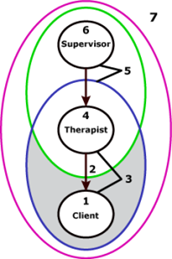Sue provides one-to one and group clinical supervision for trainees, experienced therapists and practitioners in the helping professions. She also supervise the clinical work of other supervisors. Sue's experience spans charities, counselling agencies, a CAMHS service and educational settings as well as private practice. As a supervisor, Sue uses the person-centred listening skills of her original training in combination with knowledge gained from extensive CPD to offer an integrative approach that meet the needs of individual supervisees. This can includes perspectives on CBT, solution-focused approaches, parts work, attachment-based approaches, psycho-education and a trauma informed approach.
Experience Sue draws upon includes teaching the person-centred approach at an FE college, working as an affiliated counsellor to the Psychology department of a Young Offender Institute, as a senior counselling practitioner and supervisor for a national children’s charity, group and individual supervision for a CAMHS service, group supervision for a sexual violence and domestic abuse support service, school counselling and extensive experience in private practice working with adults and teenagers.
As well as many years of general counselling experience, Sue have particular expertise in working as a supervisor with more complex mental health issues, psychological trauma, attachment issues and dissociative conditions.
Sue uses Carroll’s (1996) Integrative Generic Model as a framework for supervision. This details the 7 Tasks of supervision which are used flexibly and adjusted to suit the specific needs and experience of supervisees.
- To create the learning relationship
- To teach (share knowledge and experience)
- To evaluate (supervisor, supervisee and client process)
- To monitor professional ethical issues
- To counsel (in the context of to provide support within agreed boundaries)
- To consult
- To monitor the administration aspects of the supervisee's practice

1. The Client’s presentation.
2.  The intervention from the therapist.
The intervention from the therapist.
3. The relationship between therapist & client.
4. The supervisee
5. The parallel process
6. The supervisor
7. The socio-cultural context
- A gatekeeper for ethical standards of the profession, which involves being suitably trained, knowledgeable, experienced and up to date with legal, moral and ethical issues pertaining to the supervisory relationship, the supervisee and their client work.
- A safety net for my supervisee’s clients who choose to work with a counsellor; upholding professional standards, modelling strong ethical principles, values and working practices that are inculcated into the client therapy and ultimately holding practitioners to account for poor practices.
- An educator or consultant and as a resource to the supervisee, helping them to build their own awareness and insight, and to achieve their desired ongoing professional development and personal growth.
| |
Individual or group supervision?
 . Group supervisees may have different perspectives, levels of experience, training in specific modalities or may work in different settings. Individual one-to one-supervision allows for a greater depth of exploration of client material and for a deeper and wider supervisory relationship to develop. For many supervisees a combination of individual and group supervision provides the support needed for their practice to develop but with the additional enrichment of a group experience.
. Group supervisees may have different perspectives, levels of experience, training in specific modalities or may work in different settings. Individual one-to one-supervision allows for a greater depth of exploration of client material and for a deeper and wider supervisory relationship to develop. For many supervisees a combination of individual and group supervision provides the support needed for their practice to develop but with the additional enrichment of a group experience.
Supervision fees
